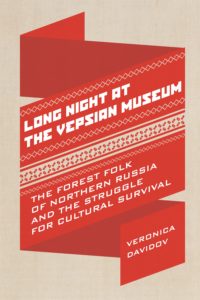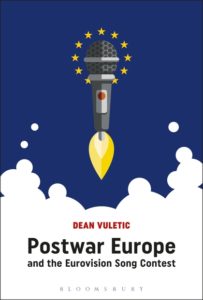
 Long Night at the Vepsian Museum: The Forest Folk of Northern Russia and the Struggle for Cultural Survival
Long Night at the Vepsian Museum: The Forest Folk of Northern Russia and the Struggle for Cultural Survival
By Veronica Davidov
Publisher: University of Toronto Press
Recommended by Samantha Lomb
Long Night at the Vepsian Museum is an ethnography that documents the history and current cultural struggles of the Veps people, a Finno-Ugric speaking minority community that lives in Russia’s Karelia region, on the border with Finland. Davidov uses the various exhibits of the Veps ethnographic museum in the village of Sheltozero as the framing mechanism to explore how the Veps have been entangled with Russian culture as economic and political actors from the 10th century on, how they have been viewed as a repository of “traditions”, folklore and linguistic diversity, and the modern struggles the community faces as resource extraction -the main livelihood of the community- has become increasingly international and commercialized, alienating the Veps from their traditional ties with nature and good paying jobs.

The Library: A Catalogue of Wonders
By Stuart Kells
Publisher: Counterpoint Press
Recommended by Hélène B. Ducros
This book is for all bibliophiles, for those who are transported by libraries’ overlapping smells of paper and ink, moved by their muted atmospheres, inspired by the sight of those readers suspended to pages – wondering what they might be reading-, and humbled by librarians’ devotion to their subjects. The book will also reach those who simply go to the library purposely to find a specific book. Indeed, The Library is an entry into the mysterious world of bookscapes. Stuart Kells envisages the libraries of the world not only as repositories for books, but as part of a complex material print culture ecosystem that embodies a continuum of historical processes and practices at the center of which the book exists. Kells uncovers the many invisible people who are involved in shaping the relationship between the book, the library and ultimately the reader. He traces the history of the library since Antiquities through a selection of real world libraries, but also vanished or imaginary ones.
The book reads like a story at the same time as it teaches us about the physicality of print media through history, as well as the intertwining of activities and characters during the life of a book, from conception to decay. Covering paper qualities to book binding, legal rights of deposit, indexing, cataloguing, bookselling, the advent of shelving, pagination and foliation, book repair, as well as the inner life of libraries, this volume makes ever so clear that the latter represent more than an accumulation of books, but rather “hotspots and organs of civilization” and places of encounters between people and between people and knowledge. In this age of digitization and technological changes that are leading to the progressive dematerialization of print culture, Kell’s tale is an homage to libraries everywhere. It will delight all bibliomaniacs and those who still appreciate the tactile connection with the book, its smell, watermarks, and imperfections, and who relish in walking through stacks and library halls where many minds, illustrious or not, have wandered before them.
 European Union Governance and Policy Making: A Canadian Perspective
European Union Governance and Policy Making: A Canadian Perspective
Edited by Emmanuel Brunet-Jailly, Achim Hurrelmann, and Amy Verdun
Publisher: University of Toronto Press
Recommended by Malcolm Campbell-Verduyn
At times of geo-political tension with its much larger neighbour to the south, Canada has often been called on to join the European Union, often – but not always- in a pseudo-serious, tongue-and-cheek manner. Such “grass is greener” commentators are well advised to read a new volume introducing the many nuances and particularities of EU governance. Edited by a trio of political scientists based in Canada, European Union Governance and Policy Making: A Canadian Perspective is a comprehensive and invaluable text for Europeanists and would-be EU citizens alike. The detailed analyses by scholars located on both sides of the Atlantic cut through the complexity of regional governance systems to provide theoretically informed accounts of both the histories and current challenges facing the EU across a wide range of intersecting policy areas, fromagriculture to security.
 Refugees, Civil Society and the State, European Experiences and Global Challenges
Refugees, Civil Society and the State, European Experiences and Global Challenges
By Ludger Pries
Publisher: Edward Elgar
Recommended by Daniela Irrera
Refugees are the most vulnerable people in the global system. International law, as well as international and regional organization charters, recognize the importance of assuring human beings who escape war, deprivation and mass atrocities, the right to be saved and protected. However, following the increasing refugees’ flows of 2015, and the manifest incapacity of the states to manage them, refugees have become a “crisis”, a category of aliens and foreigners who are difficult to integrate in European societies and are perceived as potential insecurity providers. Therefore, they are a problem to solve, rather than people to help or an opportunity for developing our communities and make them more open. The conception of refugees as a good opportunity of advancement is the perspective used by Ludger Pries in this book. By using a combination of international relations and sociological approach, he enlightens and deepens the dilemmas of Europe in facing the “crisis”. Through diverse approaches demonstrated by civil society (openness) and states (closeness), the author contributes insights on the incapacity to welcome people in a coordinated and human way.
 Postwar Europe and the Eurovision Song Contest
Postwar Europe and the Eurovision Song Contest
By Dean Vuletic
Publisher: Bloomsbury Academic
Recommended by Louie Dean Valencia-García
Dean Vuletic’s Postwar Europe and the Eurovision Song Contest moves between the Eurovision stage to the political stage. First aired in 1956, the history of Eurovision has primarily been told from the perspective of contestants, never has it been placed in its international context in this truly inventive new book. By tracing the history of the European Broadcasting Union, Postwar Europe and the Eurovision Song Contest looks at national politics in Western Europe during the post-World War II era, analyzes the contest’s appropriation in the Soviet Union, and follows the ways in which European unification was mediated through the song contest, with some countries even considering Eurovision as part of their own cultural-political diplomacy.
In his introduction, Vuletic asks “has the [Eurovision Song Contest] only been a metaphor or also a catalyst for change?” As is frequently the case, it has been both. One of the most interesting sections of this book is found in Vuletic’s descriptions of voting rules in Eurovision—even describing ways in which democratic practices were not always up to par in some participating countries, in particular, surrounding voting in Azerbaijan and Ukraine. Bringing the history of European integration from the Congress to Vienna to a trans-National song contest, Vuletic’s book does more than recall some of the greatest hits of the contest, it places Eurovision as the soundtrack of the story of European integration. For the full effect, I would recommend one read this book with their favorite Eurovision contestants playing lightly in the background.
Published on April 17, 2018.




